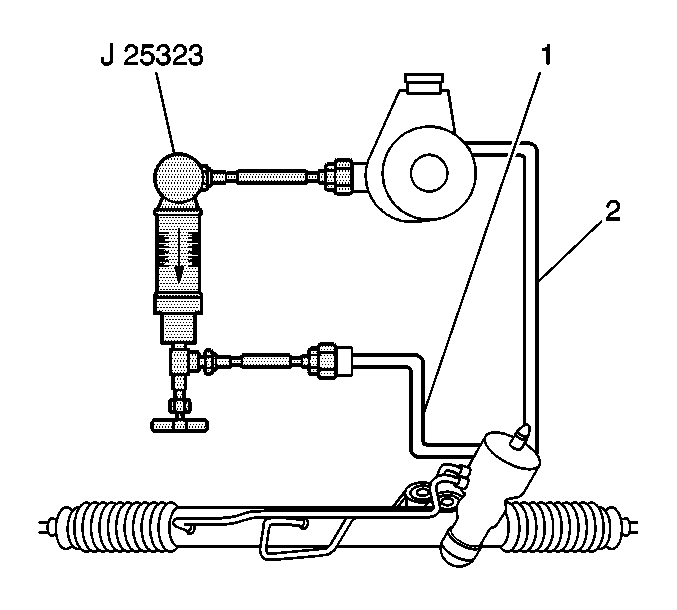Important: Ensure that the suspension system components are not binding.
Ensure that all of the power steering hose connections are tight. Loose
connections may allow air to leak into the power steering system.
- Turn the ignition OFF.
- Place a drain pan under the vehicle in order to catch any power
steering fluid.
- Disconnect the power steering pressure line (2) from the
power steering pump or the power steering gear as necessary. Refer to
Power Steering Pressure Pipe/Hose Replacement
.
- Install the J 25323-D
between the power steering pump and the power steering gear. Adapters
may be required (1) .
- Inspect and add ONLY approved power steering fluid as necessary
in order to ensure that the power steering fluid is at the FULL COLD level.
Refer to
Checking and Adding Power Steering Fluid
.
- Fully open the J 25323-D
valve.
- Start the engine.
Notice: Do not hold the steering wheel in the full turn position
longer than 5 seconds, as damage to the steering pump may result.
- Turn the steering wheel and BRIEFLY hold the steering wheel against
the steering stop in order to release any trapped air from the system.
- Inspect and ensure that all of the power steering connections
are not leaking. Refer to
Pressure readings in excess of 1379 kpa (200 psi) COULD
indicate a restriction in the power steering system. If the reading exceeds
1379 kpa (200 psi), turn the engine off IMMEDIATELY. Locate
and repair the restriction, then retest the system.
- Inspect and add ONLY approved power steering fluid as necessary
in order to ensure that the power steering fluid is at the FULL COLD level.
Refer to
Checking and Adding Power Steering Fluid
.
- Allow the engine to run until the engine reaches full operating
temperature.
- Record the pressure reading and flow reading (if applicable).
- If you are using the J 25323-D
, partially close the valve until the system pressure reaches
4827 kpa (700 psi), then record the FLOW reading. Subtract
this flow reading from the flow reading recorded in Step 12.
If the flow DECREASE is more than 3.8 liters per minute (1 gallon
per minute), there is a power steering pump internal leak. Replace the power
steering pump. Refer to
Power Steering Pump Replacement
.
Notice: Do not leave the valve fully closed for more than 5 seconds, or the
pump could be damaged internally.
- Fully close then open the J 25323-D
valve three times and record all of the high pressure readings.
The power steering system pressure relief specifications for this vehicle
is 8274-8964 kpa (1200-1300 PSI).
| • | If the three high pressure readings are within specifications
and not more than 245 kpa (50 psi) of each other, the system
is operating properly. |
| • | If the three high pressure readings are within specifications,
but NOT within 245 kpa (50 psi) of each other, inspect the power
steering flow control valve. Perform the following steps: |
| 2. | Inspect the flow control valve. |
If any burrs or scratches are noticed on the flow control valve, replace
the flow control valve. Do NOT attempt to clean the flow control valve.
If any burrs or scratches are noticed in the control valve bore, replace
the power steering pump. Refer to
Power Steering Pump Replacement
.
| 3. | Inspect the power steering fluid. |
If the power steering fluid is clean, install the flow control valve
and retest the system.
If the power steering fluid is NOT clean, flush the power steering system
and retest the system. Refer to
Power Steering System Flushing
.
- If you are using the J 25323-D
, perform the following steps:
| 15.1. | Increase the engine speed to approximately 1500 RPM and
record the flow reading. |
The power steering system high flow specifications for this vehicle
is 9.0-11.0 liters per minute (2.4-2.8 gallons
per minute).
| • | If the difference between the actual flow reading and the maximum
flow specification is more than 3.8 liters per minute (1 gallon
per minute), remove the power steering flow control valve and inspect the
power steering pump flow control valve for any wear or damage. Do NOT disassemble
the flow control valve. Replace the flow control valve if the flow control
valve is worn or damaged. Refer to
Power Steering Pump Flow Control Valve Replacement - Off Vehicle
. |
| • | If the difference between the actual flow reading and the maximum
flow specification is less than 3.8 liters per minute (1 gallon
per minute) and is NOT within specifications, replace the power steering
pump and retest the system. Refer to
Power Steering Pump Replacement
. |
| | Notice: Do not hold the steering wheel in the full turn position
longer than 5 seconds, as damage to the steering pump may result.
|
| 15.2. | Turn the steering wheel from steering stop to steering stop and record
the FLOW readings at each stop. |
| • | If the flow is LOWER than 3.8 liters per minute (1 gallon
per minute), the power steering pump and the flow control valve are operating
properly. |
| • | If the flow is HIGHER than 3.8 liters per minute (1 gallon
per minute), the power steering gear is leaking across the piston or bypassing
the valve circuit. Replace the power steering gear. Refer to
Steering Gear Replacement
. |
- Disconnect and remove the J 25323-D
from the vehicle.
- Connect the power steering pressure line. Refer to
Power Steering Pressure Pipe/Hose Replacement
.
- Bleed the power steering system. Refer to
Power Steering System Bleeding
.
- Inspect the power steering system and ensure that there are no
fluid leaks. Refer to
Power Steering Gear and Pump Leaks
.

